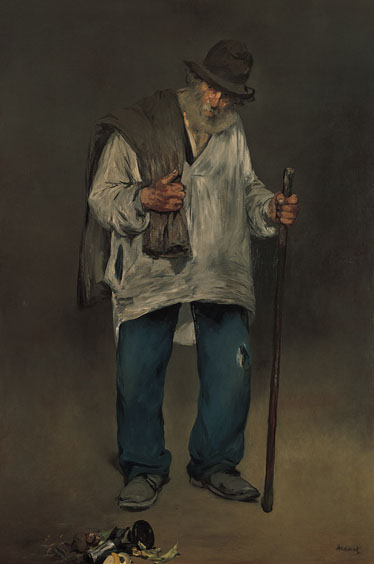A philosopher
The ragpicker, this philosopher of the night, who sets off into the city, his sack on his back and his hook in his hand, I am not sure we have the right to classify his industry among the minor trades. Most of the time, the ragpicker is a solemn and serious philosopher who sleeps all day long and works all night. The ragpicker is as relentless as destiny, he is as patient as destiny: he waits; but when the hour to take out his hook has struck, nothing can restrain his arm. A whole world has passed through his sack! The laws of the Empire hasten to join the Republican decrees in this transient pit; all the epic poems since Voltaire have passed through it; the whole newspaper, for thirty years, has sunk into this bottomless abyss, as it continued to devour that which is constantly renewed. The ragpicker's sack is the great highway down which all the rubbish of prose, verse, eloquence, imagination and thought passes. In this respect, the ragpicker is a rather unique figure, who deserves his own special history. The ragpicker is far superior to a manufacturer: the ragpicker is a magistrate, a magistrate who judges human glory irrevocably. He is at once judge, instrument and executioner.
Extract from Un hiver à Paris by Jules Janin, 1843
Artists of the Romantic period (poets, playwrights, writers and painters) seized on the figure of the ragpicker in order to turn him into a philosopher who, being free and living from day to day, seemed to them unencumbered by material contingencies: he knows human nature because he walks the streets with an observant eye.
"See this ragpicker as he passes by, bent beneath his pale lantern; there is in him more heart than in all his fellows on the omnibus."
(Lautréamont, in Les Chants de Maldoror - Chant II)
Often, in some red street-lamp's glare, whose flame
The wind flaps, rattling at its glassy frame,
In the mired labyrinth of some old slum
Where crawling multitudes ferment their scum —
With judge-like nods, a rag-picker comes reeling,
Bumping on walls, like poets, without feeling,
And scorning cops, now vassals of his state,
Begins on glorious subjects to dilate,
Takes royal oaths, dictates his laws sublime,
Exalts the injured, and chastises crime,
And, spreading his own dais on the sky,
Is dazzled by his virtues, starred on high.
Yes, these folk, badgered by domestic care,
Ground down by toil, decrepitude, despair,
Buckled beneath the foul load that each carries,
The motley vomit of enormous Paris —
Come home, vat-scented, trailing clouds of glory,
Followed by veteran comrades, battle-hoary,
Whose whiskers stream like banners as each marches.
— Flags, torches, flowers, and steep triumphal arches
Rise up for them in magic hues and burn,
Since through this dazzling orgy they return,
While drums and clarions daze the sun above,
With glory to a nation drunk with love!
Thus Wine, through giddy human life, is rolled,
Like Pactolus, a stream of burning gold;
Through man's own throat his exploits it will sing
And reign by gifts, as best befits a king.
To lull their laziness and drown their rancour,
For storm-tossed wrecks a temporary anchor,
God, in remorse, made sleep. Man added Wine,
Child of the Sun, immortal and divine!
Charles Baudelaire, Les Fleurs du Mal
Translated by Roy Campbell, Poems of Baudelaire (New York: Pantheon Books, 1952)











